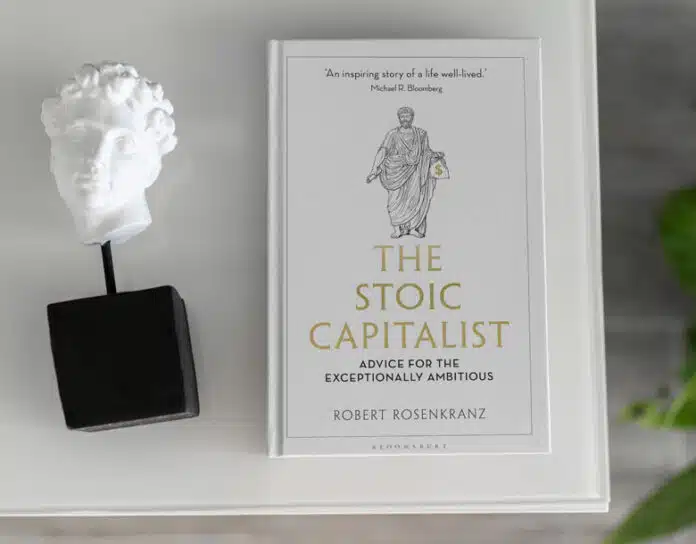Robert Rosenkranz, a success story born and raised on New York City’s West Side when it was the mean turf of warring gangs, now has homes in Aspen, the Hamptons and Manhattan’s East Side.
In his new book, “The Stoic Capitalist: Advice for the Exceptionally Ambitious,’’ Rosenkranz describes a childhood fraught with fear from his father’s passivity and joblessness for two years, and his breadwinning mother’s “emotional intensity’’ about the “enormous pressure of paying the bills.’’
But brightness and ambition prevailed: Rosenkranz won a scholarship to a private Manhattan school, then a scholarship to Yale where he graduated summa cum laude majoring in economics. Then, to broaden his scope and CV, he studied law at Harvard.
Today, Rosenkranz, nearing 83, is chairman of Delphi Capital Management, an investment firm that oversees more than $40 billion of assets. He’s also the founder of a group of investment and private equity partnerships.
Lessons Learned
What got him through the tough years? Applying lessons learned from reading books by successful financiers and businessmen, and, a reliance on the teachings of ancient philosophers — chiefly Seneca, Marcus Aurelius and Epictetus.
“I took away the lesson of self-reliance and critical thinking,’’ Rosenkranz writes.
And skepticism, about everything from the financials of a company to the motives of single women when he became eligible after divorce.
Additional Reading: Top Books Advisors Can Give Their Peers
Rosenkranz lays out — in T.E. Lawrence-”The Seven Pillars of Wisdom’’ fashion — his seven aphorisms, or observations, developed from reading philosophy, attending Ivy League colleges in the 1960s, and working in a world in which being Jewish didn’t make life easier.
But with his exceptional ambition and discipline, Rosenkranz prevailed and gained entree to lucrative jobs, worldly friends, travel, and influence in civic affairs.
His intellect opened doors, and his cherished aphorisms kept him steady. These aphorisms are: reason is the highest human attribute; distinguish between fact and interpretation; regulate emotions; expect change; value time; do less but do less well, and act to benefit society.
More Advice for Advisors
Financial advisors will find solid advice in chapters on negotiating tactics in business and law; the nuances of making tax law be an advantage; how to discern what industries have upward mobility; why studying the behavior of marketplace participants is as important as knowing a company’s financial condition and business fundamentals; advising clients on estate settlements, and learning the difference between minimizing risk and pricing correctly.
“There is no such thing as a bad insurance risk: there is just a risk where the premium is inaccurate,’’ Rosenkranz writes of Delphi’s way of doing business in the insurance industry.
Rosenkranz’s chapters on choosing an investment manager provide good information from “the other side.’’ He discusses the importance of distinguishing luck from skill in investment track records, and why Warren Buffett’s contrarian advice about picking investments — “Be greedy when others are fearful; be fearful when others are greedy’’ — is sound but needs a strong GI tract.
Rosenkranz says the surest way to find the true value of a company is to read its audited financial statements. Also, he says beware of inflated managers’ fees, and, that one can tell a lot by sizing up a manager’s strategy and character.
Mentors and More
Mentors were essential to Rosenkranz’s success, he says. As a younger man, he forged important connections with corporate leader-financier Joe Mailman; Leon Levy, senior partner at Oppenheimer & Co., and Maurice R. Greenberg, the now 100-year-old former CEO of global insurer American International Group. AIG was famous during the 2008-09 financial credit crisis for receiving a $141.8 billion bailout from United States taxpayers; AIG paid it back.
Rosenkranz sees appreciation of art, continuing study and philanthropy as paths to achieving what he calls a well-lived, rounded life; indeed the book’s dust jacket describes him as “a Renaissance man who is insatiably curious.’’
The Rosenkranz Foundation has endowed Yale’s Rosenkranz Writer-in-Residence program, paid for exhibitions at the Guggenheim Museum, donated a collection of art to Harvard University, and funded a book series published by Yale University Press..
But on philanthropy, Rosenkranz says that “giving back’’ implies that you obtain the means to be philanthropic by taking something away from society.
“Philanthropy should be motivated not by guilt but the personal satisfaction it offers,’’ he writes.
Richard Beattie, the mergers lawyer and pioneer of private equity takeovers with Henry Kravis, whose financial expertise Rosenkranz admired, saw it differently: “I’ve been very fortunate to move within the public sector and the private sector,” Beattie told The American Lawyer. “Once you become successful, it’s important to give back.” Beattie died June 6 in Manhattan, at 86.
Politically Speaking
In chapters not specific to financial management and investment, Rosenkranz’s writing moves from solid fundamentals to the more everybody-is-entitled-to-their-opinion school.
Rosenkranz is candid about being impressed by flawed figures such as Joseph P. Kennedy, an isolationist during the early days of World War II, and a womanizer. Regarding Kennedy’s philandering Rosenkranz says, “I liked that he had a lot of fun … a bad boy with actress girlfriends.’’
Politically, Rosenkranz calls himself an “orphan,’’ having switched from voting for Democratic candidates, to, as his wealth accrued, becoming more conservative. He then registered as a Republican in 1984 when he voted to re-elect Ronald Reagan as president of the U.S. In the current contentious political era, he has no firm allegiance.
One can only guess what Rosenkranz makes of the present administration, but there is much to chew on from two comments late in the book.
Before Donald Trump’s first presidency (2016-2020), when Trump was indebted to a large group of banks for about $1 billion, Rosenkranz was offered a $10 million part of Trump’s debt at a deep discount. Rosenkranz writes that the idea that he might participate in bringing Trump down, as a holdout creditor, was satisfying. Nevertheless, Rosenkranz chose not to buy the debt.
“If I had been the holdout creditor that forced Donald Trump to declare bankruptcy, might that have altered the course of history?’’ Rosenkranz ponders.
Five years later, as the second Trump Administration announces withdrawing federal support from certain American universities, including Rosenkranz’s alma maters, Yale and Harvard, there is this from Rosenkranz’s chapter, “Death and Taxes,’’ presumably written before Jan. 20, 2025:
“You can bequeath money directly to organizations you believe in, and this is the path I am choosing. I have decided to emphasize elite research universities.(They) strike me as the only class of institutions likely to sustain their relevance and their excellence for generations to come.’’
“The Stoic Capitalist. Advice for the Exceptionally Ambitious’’ by Robert Rosenkranz. 262 pages. $28. Bloomsbury Business.







